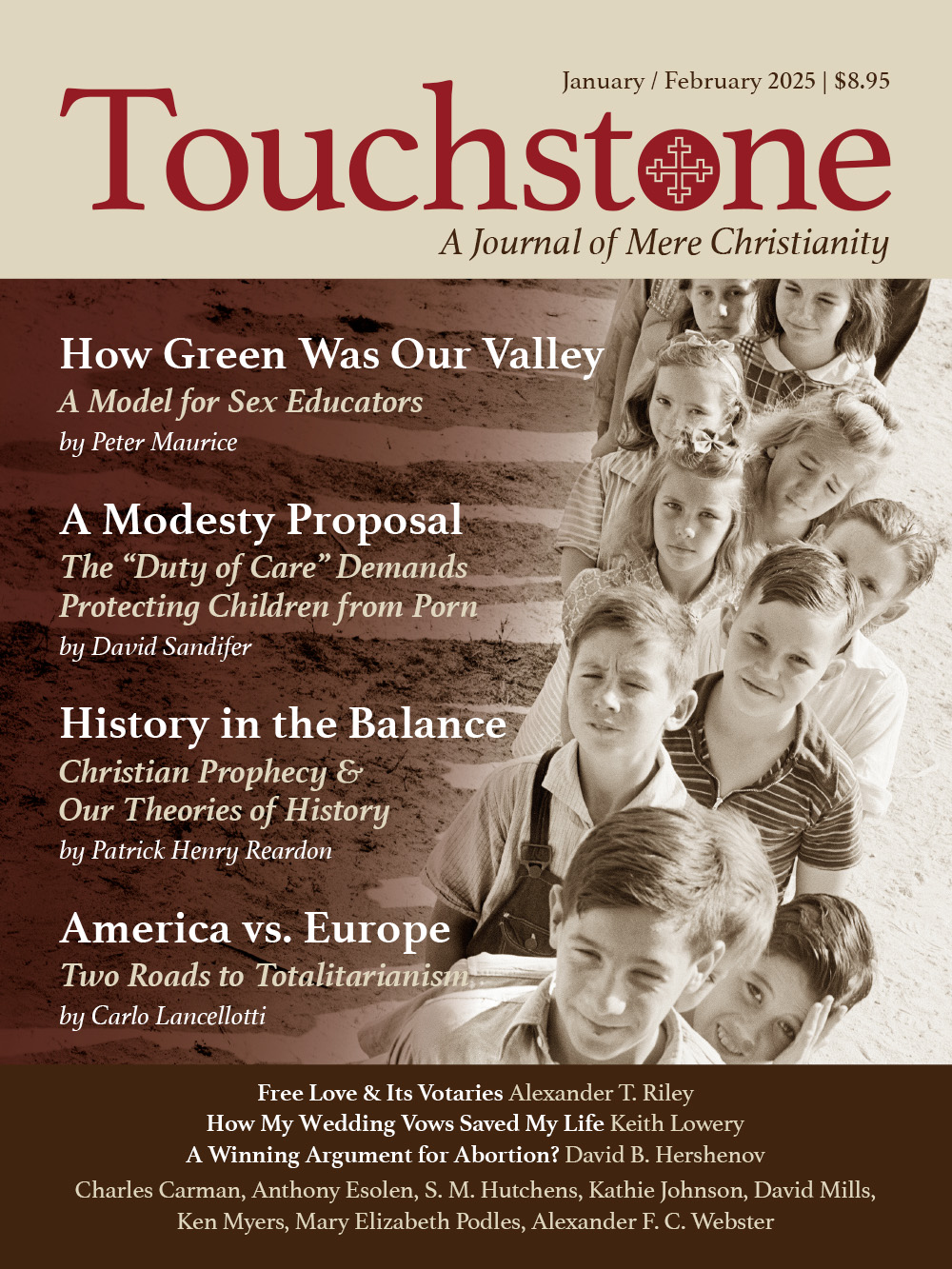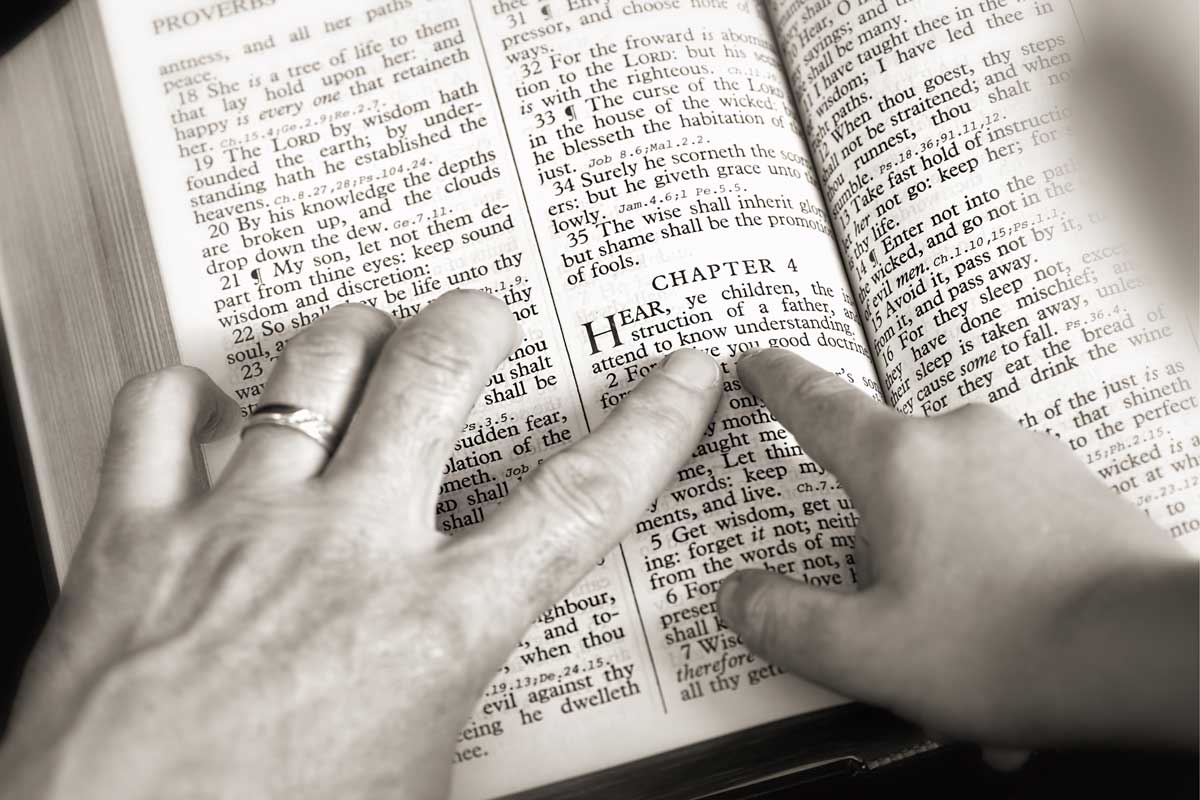A Modesty Proposal
The “Duty of Care” Demands Protecting Children from Porn
Whoever causes one of these little ones who believe in me to sin, it would be better for him to have a great millstone fastened around his neck and to be drowned in the depth of the sea. (Matt. 18:6)
I started watching porn when I was, like, 11. . . . I think it really destroyed my brain and I feel incredibly devastated that I was exposed to so much porn. (Pop singer Billie Eilish, quoted in The Guardian, Dec. 15, 2021)
The ubiquity of pornography in the early twenty-first century is one of the major cultural developments of our era, one that is only beginning to be studied and understood for its social impact. Some observers (and the legislatures of sixteen states) have described it as a public health crisis. This is especially true as more and more children are exposed to pornography through access to the internet. In spite of this, Christians have largely resigned themselves to the pornography explosion and, with a few exceptions, have not been at the forefront of advocating for policy solutions in the last twenty years.
This is strange. In the 1970s and 1980s, when pornography first became widely available, Christians led anti-porn campaigns in Britain, the U.S., and Australia. Yet even as porn has exploded with the rise of the internet in the 1990s, followed by the advent of smartphones in 2007, Christians have become less engaged with the issue at a political level. No doubt political and legal defeats took some of the steam out of these movements. Also, some Christians, especially as their social standing rose, became uncomfortable associating themselves with the purity crusades and “moral panics” of earlier eras, and of being viewed as what Australians call “wowsers”—moral busybodies. And without question, many Christians simply became too inured to the pornification of society to fight back.
Yet the societal damage caused by pornography is real and profound. The evidence demonstrating the harm caused by porn is now incontrovertible. Those who consume porn are more likely to: engage in early sexual activity but are less likely to marry; view women as sex objects; have difficulty forming intimate relationships; devalue fidelity; and are more apt to rationalize sexual violence. Brain research on porn-addicted individuals demonstrates a measurable deterioration in cognitive function similar physiologically to that seen in drug addicts and alcoholics. There is growing evidence that the dramatic rise in erectile dysfunction in young men is linked to porn use, and pornography is associated with a higher risk of divorce in married couples and, by some counts, is a factor in over half of U.S. divorce cases today.
The Mystery of Modesty
Attempts to combat pornography at the public policy level will rest largely on the demonstration of these “objective harms” as part of the public reasons guiding a response. Yet from a Christian perspective, the first task is to place pornography within a theological framework. It is important to think more deeply about what makes it so destructive, something more than simply an illicit private pleasure.
It bears remembering that the Church was born into a cultural context of diverse sexual expressions often unencumbered by moral judgments, and that many of the writings both in the New Testament and the patristic period were self-consciously seeking to engage this setting for the purpose of Christian discipleship. Christian tradition has a rich vocabulary relating to the ethics of sex, some of it drawn from the Scriptures and some of it extra-biblical, reflecting its historical importance in church teaching. Negatively, words such as “lust,” “fornication,” “wantonness,” “concupiscence,” “prurience,” “obscenity,” “cupidity,” “depravity,” “perversion,” “defilement,” “lewdness,” “shame,” and “unnatural” mark out the semantic field; positively, the words “chastity,” “purity,” “innocence,” “continence,” and “modesty” point to the desired virtues.
All of these to some degree come into play as we consider pornography. Of particular significance is the word “modesty”—and, perhaps even more so, its French equivalent, pudeur (pyoo-’der), which arguably has a richer and wider resonance. Thus, the French legal code until the beginning of this century referred to statutory rape as attentat à la pudeur and to indecent exposure as outrage public à la pudeur —pudeur here conceived not merely as a personal attribute but as something that exists in the public space, and that the state has a responsibility to protect.
Belgian writer Christophe-Geraldine Métral, in La pudeur, ou l’être discret, argues that pudeur is related to the wish to preserve what is most personal from “banalization and objectification.” It is “a kind of tact which is concerned with that which cannot suffer to be publicized . . . without being devalued.” French philosopher Janine Rossard, in Une clef du Romantisme: La pudeur, describes it as springing from the conflict between two levels of human life, that of the body, and that with a “higher demand,” the spiritual. Pudeur functions as a reflection of the tension between these two levels—Balzac called it “la conscience du corps,” the conscience of the body. This is what Max Scheler—who accorded modestya central role in his philosophical project—had in mind when he described it as that which makes it possible to “consecrate one’s intelligence and one’s efforts to objective values, by limiting the powerful and ever-present tendency to abandon oneself to the impulses of the libido.” For Métral, it is the very mystery of modesty which makes it a signpost to something else: it “redounds to man as a being relating in a primary manner to himself and to transcendence.”
The Repudiation of Restraint
Modesty, then, is conditioned on a rejection of a materialist conception of our humanity and presupposes a belief in transcendence. It reflects, in Métral’s words again, “the uncertainty of existence, the premonition that one is a being for whom it is not true that all is of equal value, that one can do whatever one pleases, in any way, with respect to one’s body and one’s feelings”; thus, “it is, in its essence, the intuition of value.”
David Sandifer teaches ethics and practical theology at Tyndale Theological Seminary in Amsterdam. His Ph.D. (Cambridge, 2014) looked at concerns about the protection of moral innocence in early nineteenth-century Britain. Previously, he served as a pastor in the U.S. and Australia, and he co-founded Porn Harms Kids in Australia (later echildhood.org).
subscription options
Order
Print/Online Subscription

Get six issues (one year) of Touchstone PLUS full online access including pdf downloads for only $39.95. That's only $3.34 per month!
Order
Online Only
Subscription

Get a one-year full-access subscription to the Touchstone online archives for only $19.95. That's only $1.66 per month!
bulk subscriptions
Order Touchstone subscriptions in bulk and save $10 per sub! Each subscription includes 6 issues of Touchstone plus full online access to touchstonemag.com—including archives, videos, and pdf downloads of recent issues for only $29.95 each! Great for churches or study groups.
Transactions will be processed on a secure server.
more on education from the online archives
more from the online archives

24.6—Nov/Dec 2011
Liberty, Conscience & Autonomy
How the Culture War of the Roaring Twenties Set the Stage for Today’s Catholic & Evangelical Alliance by Barry Hankins
calling all readers
Please Donate
"There are magazines worth reading but few worth saving . . . Touchstone is just such a magazine."
—Alice von Hildebrand
"Here we do not concede one square millimeter of territory to falsehood, folly, contemporary sentimentality, or fashion. We speak the truth, and let God be our judge. . . . Touchstone is the one committedly Christian conservative journal."
—Anthony Esolen, Touchstone senior editor












